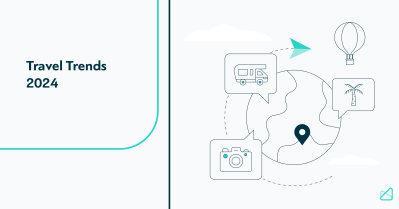What are Travel Intermediaries? This is Their Role in the Tourism Industry


What Are Travel Intermediaries?
Who was the first tourism intermediary, what are the functions of travel intermediaries in tourism, types of travel intermediaries, examples of travel intermediaries, negative impacts of intermediaries on tourism.
Travel intermediaries are some of the most critical agents in the tourism distribution channel. Thanks to tourism intermediation, among other factors, the travel and tourism industry is one of the fastest-growing industries worldwide .
It’s also one of the most resilient industries. Although it took a massive hit due to COVID-19 travel restrictions, which made its revenue plummet by more than 50%, the market is expected to recover and start growing again.
According to Statista , the travel and tourism market is expected to reach $385,865 million in revenue in 2021 . If it shows the projected CAGR of 24.03%, it will reach the market volume of $913,275 million by 2025 , generating 72% of total revenue through online sales.
How do travel intermediaries help the market grow? What are they, really, and what is their role in tourism? Read on to find out.
The simplest definition of a travel intermediary is a “ distribution agent that participates in the sale and/or brokerage of travel and tourism-related products and services .”
Travel intermediaries act as middlemen between suppliers and consumers , buying and reselling products and services related to tourism, such as packaged holidays, tickets, tours, accommodation, car hire, etc.
For instance, a B2B tour operator can sell one-day tours to a travel agent, who then sells them to consumers.
Travel intermediaries can act as middlemen between multiple parties in the tourism distribution channel , resulting in several stages in the supply chain, including principals, wholesalers & aggregators, retailers, and consumers .
For instance, a bed bank that buys accommodation products can sell them to other bed banks, tour operators, travel agents, airlines, and online travel agencies (OTAs).
The first tourism intermediary was Thomas Cook , a famous English businessman and founder of Thomas Cook & Son (later Thomas Cook Group), the first travel agency as we know it.
Thomas Cook was a passionate advocate of the temperance movement. Back in 1841, he wanted to attend a rally in Loughborough, so he made a deal with the Midland Railway to organize a group tour for a commission. His return rail journey was an excursion that made history, leading to other leisure and commercial trips.
In 1855, Thomas Cook organized the first international tour , offering the first holiday package ever , which included travel, accommodation, and food.
The agency’s successor, Thomas Cook Holidays , bought the brand in 2019 when the company went into liquidation.
The primary role of travel intermediaries in tourism is to provide travel-related products and services to consumers . Whether they offer tours, tickets, transportation seats, accommodation, or any other related service, they purchase them from suppliers and resell them to travelers.
As such, they can perform a variety of value-added functions , including:
- Providing information about the available travel and tourism products and services
- Making reservations and travel arrangements
- Creating travel packages
- Preparing tickets and confirming bookings
- Contacting leads, prospects, and customers
- Buying or reserving products in bulk to resell to businesses or travelers
- Promoting excess inventories
- Reducing customer acquisition costs
There are two main types of travel intermediaries :
- Wholesalers & aggregators
When it comes to wholesalers & aggregators , travel trade intermediaries can be:
- B2B tour operators – they sell tours to travel agents
- Bed banks – B2B companies that buy bulk accommodation products at a discounted, fixed price for specific dates and resells them to travel agents, OTAs, tour operators, airlines, and other bed banks
- DMCs (Destination Management Companies) or DMOs (Destination Management Organizations) – they sell tours, events, activities, transportation products, and travel packages to tour operators;
- Global Distribution Systems (GDSs) – computerized network systems with availability records from hotels, airlines, travel agencies, and car rental companies, providing real-time inventory access to retailers.
- As for retailers in tourism intermediation , there are:
- Travel agents – brick-and-mortar travel agencies, the main of which are high street travel agents and specialist business travel agents
- OTAs – online marketplaces that allow consumers to book travel products and services and explore travel reviews
- B2C tour operators – online platforms that offer access to OTAs, hotels, car rental companies, and other tourism suppliers.
Some of the most popular travel trade intermediaries are Booking, Expedia, Viator, Hotels, Trip.com, Despegar, and Travelocity. Those are some of the top online travel agencies worldwide that hundreds of travel and tourism suppliers have partnered with.
TravTravel and Miki Travel are excellent examples of B2B tour operators , while Exodus Travels, Intrepid Travel, Trailfinders, Holiday Architects, Wild Frontiers, and Selective Asia are their popular B2C counterparts .
If you’re looking for a good GDS , you can’t go wrong with Amadeus, Galileo, Sabre, Pegasus, Worldspan, and Apollo.
As for DMCs or DMOs , some of the most notable include Marketing Manchester, Global DMC Network by JTB Group, Hosts Global, Terra Events, PRA, IVI DMC Enterprises, Terramar, and Ovation Global DMC.
Some of the most popular bed banks are Hotelbeds, Bonotel, Travco, HotelsPro, WebBeds, and Stuba.
Last but not least, some of the most renowned high street travel agents include Cooperative Travel, TUI, and Hays Travel, while TravelPerk and DIB Travel are a few prominent specialist business travel agents .
While travel intermediaries help the travel and tourism industry grow, they have posed particular challenges to the market’s infrastructure .
As there are more and more intermediaries out there, many service providers find it challenging to cut through the noise of competition and reach potential customers. That’s particularly true of small and medium-sized businesses that can’t match the big players’ budgets.
Another issue appears with many OTAs remitting occupancy taxes based only on the discounted purchase prices , not on the retail prices. That makes it challenging for hotels to recover the lost revenue , as they apply their occupancy rates to their room’s total prices.
That’s why many governments are stepping in to collect total tax revenues on accommodation and other travel services that intermediaries sell in their jurisdictions.
If you’re looking for ways to increase your booking profits , Hotelmize can help. With our AI-based platform’s price-prediction algorithms, you can unlock hidden revenue opportunities, achieve maximum arbitrage, and supercharge your profit margins .
Book a demo today to see it in action.
Subscribe to our newsletter
Yay you are now subscribed to our newsletter.
Cristóbal Reali, VP of Global Sales at Mize, with over 20 years of experience, has led high-performance teams in major companies in the tourism industry, as well as in the public sector. He has successfully undertaken ventures, including a DMO and technology transformation consulting. In his role at Mize, he stands out not only for his analytical and strategic ability but also for effective leadership. He speaks English, Spanish, Portuguese, and Italian. He holds a degree in Economics from UBA, complementing his professional training at Harvard Business School Online.
Mize is the leading hotel booking optimization solution in the world. With over 170 partners using our fintech products, Mize creates new extra profit for the hotel booking industry using its fully automated proprietary technology and has generated hundreds of millions of dollars in revenue across its suite of products for its partners. Mize was founded in 2016 with its headquarters in Tel Aviv and offices worldwide.
Related Posts

Unveiling the 13 Hottest Travel Trends of 2024
13 min. No one knows better than you how dynamic the realm of travel is. Dynamic shifts brought by technological strides, ever-changing traveler priorities, and global events are the new normal in 2024. How do you navigate this landscape that keeps transforming? You should familiarize yourself with the very travel trends that shape the world […]

30 Most Important Travel Industry Events for 2024
30 min. Social share: 2024 is packed with must-attend travel industry events. Stop by to discover all relevant events conveniently grouped by continents with listed dates, themes, and locations! Many travel industry experts believe that travel industry events play a pivotal role in shaping the future of the travel industry. Why is this so? It’s […]

Empowering Equality: Mize Leads the Way in Travel Technology
7 min. Are we all equal? Are we all equally represented in the business world? In some professional sectors, there might still be some under-representation of women, minorities, and the LGBTQIA+ community. The tech sphere is no different, but is the travel tech sector a spark of hope? As the business world becomes more diverse, […]
Find & Reserve
1 Room : 1 Adult , /Room 0 Children /Room
(Age-based rates may be available)
- Government & Military
- Senior Discount
- Corporate / Promo / SET#
- Find a Hotel
- Find a Hotel for Groups (10+ rooms)
- Browse by Destination
- Lookup Reservation
- Worldwide Telephone Reservations
Special Offers
- Experiences by Marriott ℠ Packages
- Hotels & Flight Packages
- Cars, Tours & Activities
- All-Inclusive Resorts & Vacations
- Marriott Vacation Club Offers
- Browse by Interest
- The Ritz-Carlton Yacht Collection
- Marriott Bonvoy Traveler
- Shop Marriott
- Shop Westin
Exclusive getaways, member offers & more
- Meetings & Events Overview
- Business Meetings
- Social Events
- Group Travel
Imagine Your Dream Vacation

NEW SECURE SINGLE SIGN ON
Access to all of marriott's intermediary partner programs, marriott's travel agents website enables you to:.
- Access convenient online commission services
- View Marriott's commission policy
- Learn about Marriott's Hotel Excellence! Training Program
- Learn about Marriott’s Preferred Travel Agency Program
- Book your exclusive Fam-Tastic rates at thousands of hotels worldwide
MI Partner Privileges
All-Inclusive by Marriott Bonvoy ™
Hotel excellence training .
404 Not found
- Credit cards
- View all credit cards
- Banking guide
- Loans guide
- Insurance guide
- Personal finance
- View all personal finance
- Small business
- Small business guide
- View all taxes
You’re our first priority. Every time.
We believe everyone should be able to make financial decisions with confidence. And while our site doesn’t feature every company or financial product available on the market, we’re proud that the guidance we offer, the information we provide and the tools we create are objective, independent, straightforward — and free.
So how do we make money? Our partners compensate us. This may influence which products we review and write about (and where those products appear on the site), but it in no way affects our recommendations or advice, which are grounded in thousands of hours of research. Our partners cannot pay us to guarantee favorable reviews of their products or services. Here is a list of our partners .
The Pros and Cons of Booking Through Online Travel Agencies

Many or all of the products featured here are from our partners who compensate us. This influences which products we write about and where and how the product appears on a page. However, this does not influence our evaluations. Our opinions are our own. Here is a list of our partners and here's how we make money .
You’re likely already familiar with online travel agencies, even if you don’t travel often. These companies — such as Priceline , Expedia and Orbitz — act as intermediaries between you and a travel provider.
Booking your travel through an OTA can be a good idea in some circumstances, but you’ll want to be wary of its pitfalls. Let’s take a look at the pros and cons of online travel agencies, so you’ll know what to use to book your next vacation.
Pros of booking through online travel agencies
There are certainly advantages booking through online travel agencies, though you’ll find different experiences whether you’re using public OTAs — such as Kayak — or private ones like those offered by your card issuer, such as the Chase's travel portal .
✅ It may be cheaper
When searching for flights online, you may see different prices for the same routes that vary across websites. Although it may be a result of fare type — for example, some search results may not clarify that a fare is basic economy rather than main cabin or economy — other times, the difference comes down to competition for your business.
Online travel services will often offer slightly lower prices on flights in an effort to entice you as a customer. This is true for both hotels and airlines.
» Learn more: Best credit cards for online travel-booking websites
✅ It can earn you more rewards
Have you ever heard of shopping portals ? By logging into a shopping portal, you can earn rewards for purchases made with many online merchants. Some hotel chains, such as Hilton , Marriott and IHG , can be accessed through shopping portals while still booking directly on the hotel website. In this way, you can earn rewards with the hotel directly as well as with the shopping portal.
The same isn’t true for shopping portals and most airline sites. However, many public online travel agencies are accessible through shopping portals, which can then earn you rewards for airfare bookings. By opting to book in this way, you’ll be able to earn points or cash-back rewards through the shopping portal that you’d otherwise miss.
Some card issuers will also reward you heavily when using their online travel services. Clear examples of this can be seen with Capital One and Chase. With the Capital One Venture X Rewards Credit Card , for example, you’ll get 10 miles per dollar spent on hotels and rental cars booked through Capital One Travel .
The Chase Sapphire Reserve® is similar. With this card, you can get 10 Ultimate Rewards® points per dollar spent on hotels and rental cars booked through Chase's portal.
While these numbers are high, it’s important to remember that there are trade-offs when booking through an OTA rather than directly with a hotel or airline. We’ll get into that a little later.
Online travel agencies offered by your card issuer may not feature the same prices as booking directly; you’ll want to compare these before committing to a purchase.
Some card issuers will go so far as to give your points more value when redeeming through their online travel agencies.
This is true with the Chase Sapphire Preferred® Card . When redeeming points on Chase's travel portal, you’ll get 1.25 cents in value per point rather than 1 cent elsewhere.
» Learn more: How much are your airline miles and hotel points worth this year?
Cons of booking through online travel agencies
There are several downsides when it comes to using online travel services for booking travel. It mainly comes down to the fact that travel providers prefer that you book directly with them — and offer more perks to woo your business.
❌ It can be harder to change a booking
Ever needed to change a flight after it's booked? No matter the reason, attempting to alter or otherwise cancel a flight can be a hassle — especially if you’ve booked through a third party.
Generally speaking, rather than offering you direct assistance, both hotels and airlines will recommend you contact the online travel agency you’ve booked with in order to make any changes.
While you may be able to make changes or get refunds with the travel agency, airlines and hotels can — and will — offer much more flexibility when you’ve booked with them directly. You may also be subject to additional fees charged by the online travel agency, which can erase any savings you’ve received.
❌ You may not receive elite benefits
This is the real kicker for anyone wanting elite status. Although airlines will almost always recognize your elite status and allow you to earn miles even for bookings made through an online travel agency, hotels and rental car companies will not.
This is especially important for hotel chains. Earning elite status with hotels generally relies on elite night credits. Although these can be earned in a variety of ways — including having complimentary status by holding certain credit cards — the main method of acquiring elite night credits is by spending nights in hotels. Rooms booked through an online travel agency do not count toward elite status as elite night credits.
Additionally, you will not receive any of the benefits of your existing elite status if your booking is through a third party. This can mean the loss of perks such as room upgrades, complimentary breakfast and even free Wi-Fi.
» Learn more: The best airline and hotel rewards loyalty programs this year
❌ It may be more expensive
Did you know that many hotel chains have best price guarantees? Hyatt, Hilton, Marriott and IHG all have a guarantee that’ll give you either points or a discount if you find a better rate elsewhere.
These guarantees are generous; Hilton, for example, will match the rate and then discount it by a further 25%.
Although you’ll need to file claims for these guarantees and they face limitations — such as a 24-hour window from when you made the booking — you can save a lot of money on your stay if your request is approved.
Online travel agencies can be hit or miss
There are two sides to every coin and this is no different, as there are several benefits and limitations of online travel services. Depending on your needs and loyalty program status, you’ll want to choose whether to book directly with a travel provider or rely on OTAs to do the job for you.
Booking travel through credit card portals from issuers like Chase and Capital One can earn you big rewards. But if you anticipate altering your travel plans or aim to earn elite status instead, booking directly is the way to go.
How to maximize your rewards
You want a travel credit card that prioritizes what’s important to you. Here are our picks for the best travel credit cards of 2024 , including those best for:
Flexibility, point transfers and a large bonus: Chase Sapphire Preferred® Card
No annual fee: Bank of America® Travel Rewards credit card
Flat-rate travel rewards: Capital One Venture Rewards Credit Card
Bonus travel rewards and high-end perks: Chase Sapphire Reserve®
Luxury perks: The Platinum Card® from American Express
Business travelers: Ink Business Preferred® Credit Card

on Chase's website
1x-5x 5x on travel purchased through Chase Travel℠, 3x on dining, select streaming services and online groceries, 2x on all other travel purchases, 1x on all other purchases.
60,000 Earn 60,000 bonus points after you spend $4,000 on purchases in the first 3 months from account opening. That's $750 when you redeem through Chase Travel℠.

1.5%-6.5% Enjoy 6.5% cash back on travel purchased through Chase Travel; 4.5% cash back on drugstore purchases and dining at restaurants, including takeout and eligible delivery service, and 3% on all other purchases (on up to $20,000 spent in the first year). After your first year or $20,000 spent, enjoy 5% cash back on travel purchased through Chase Travel, 3% cash back on drugstore purchases and dining at restaurants, including takeout and eligible delivery service, and unlimited 1.5% cash back on all other purchases.
$300 Earn an additional 1.5% cash back on everything you buy (on up to $20,000 spent in the first year) - worth up to $300 cash back!

on Capital One's website
2x-5x Earn unlimited 2X miles on every purchase, every day. Earn 5X miles on hotels and rental cars booked through Capital One Travel, where you'll get Capital One's best prices on thousands of trip options.
75,000 Enjoy a one-time bonus of 75,000 miles once you spend $4,000 on purchases within 3 months from account opening, equal to $750 in travel.

Switch language:

Data Insights
Leading travel intermediaries in the online travel theme.

- Share on Linkedin
- Share on Facebook
The future of the travel & tourism industry will be shaped by a range of disruptive themes, with online travel being one of the themes that will have a significant impact on travel intermediaries. A detailed analysis of the theme, insights into the leading companies, and their thematic and valuation scorecards are included in GlobalData’s thematic research report,Online Travel, 2022 Update – Thematic Research. Buy the report here .
Smarter leaders trust GlobalData
Premium insights online travel, 2022 update - thematic research.
Buy the Report
Premium Insights
The gold standard of business intelligence.
Find out more
Related Company Profiles
Booking holdings inc, expedia group inc.
Globally, travellers are increasingly online and more mobile savvy than ever before. Concurrently, during 2015-2019, global online travel intermediaries (online travel agents, tour operators, and other providers) saw their market value experience rapid growth, at compound annual growth rate (CAGR) of 9.3%. During 2021-2025, the online travel market value is projected to grow at a compound annual growth rate (CAGR) of 15.1%, as travellers increasingly switch to online travel intermediaries over in-store travel agents.

The needs of travellers are constantly evolving and as a result, online travel intermediaries will have to change and adapt to meet future demands. Within the online travel industry, there has been an increasing focus on personalisation by online market players as loyalty to a particular brand is being replaced by a traveller’s loyalty to their own preferences. In addition, social media has become a strategic channel for marketing and customer service. With this, Big Data, travel apps, artificial intelligence, and machine learning play a major role in online travel companies’ strategies, with leading players investing heavily in these areas.
However, not all companies are equal when it comes to their capabilities and investments in the key themes that matter most to their industry. Understanding how companies are positioned and ranked in the most important themes can be a key leading indicator of their future earnings potential and relative competitive position.
According to GlobalData’s thematic research report, Online Travel in Travel & Tourism , leading adopters include: Airbnb , Expedia , Booking Holdings, Despegar, TripAdvisor , MakeMyTrip , Trip.com, Seera, Intrepid Group, Flight Centre Travel Group and Jet2 .
Insights from top ranked companies
Airbnb
Airbnb was once identified as a disruptor in the travel and tourism landscape but is now a major leader in the themes of online travel and personalisation. Active since 2008, the site now lists more than five million rooms, flats, and houses in almost every country across the globe. Early adoption in innovative technologies such as the cloud, AI, and Big Data have aided its successes in personalising content, driving satisfaction from both its customers and hosts on its online platform.
Expedia
Expedia Group is one of the world’s largest travel platforms. A combination of 16 brands, Expedia is a major online travel agency (OTA) that offers travellers an array of services that enable them to book or search for holiday packages, flights, hotels, rental cars, rail journeys, cruises, activities, attractions, and services. Consistently acquiring more businesses alongside forming partnerships with hotels and businesses, Expedia is a key leader within the online travel industry. Expedia Group Media Solutions, the digital marketing arm of Expedia Group, analyses first-party data to understand traveller behaviour, working in collaboration with destination management organisations (DMOs) and other stakeholders to provide actionable insights and creative campaigns.
Booking Holdings
Booking Holdings is recognised as one of the largest operating OTAs worldwide, providing services to customers and partners in over 220 countries and territories through its six-primary consumer-facing brands— Booking .com, Kayak, Priceline, Agoda, RentalCars, and OpenTable. The company has long been working towards creating the ‘connected trip’, a channel that focuses on curating traveller’s experiences through one central platform offering personalised and individual recommendations.
To further understand the key themes and technologies disrupting the industry, access GlobalData’s latest thematic research report on Online Travel in Travel & Tourism .
- GetYourGuide
- G Adventures
- Secret Escapes
- On the Beach Group
- Hays Travel
Blending expert knowledge with cutting-edge technology, GlobalData’s unrivalled proprietary data will enable you to decode what’s happening in your market. You can make better informed decisions and gain a future-proof advantage over your competitors.
Be better informed
GlobalData , the leading provider of industry intelligence, provided the underlying data, research, and analysis used to produce this article.
GlobalData’s Thematic Scorecard ranks companies within a sector based on their overall leadership in the 10 themes that matter most to their industry, generating a leading indicator of their future earnings and relative position within key strategic areas.

Data Insights Online Travel, 2022 Update - Thematic Research
More relevant.
Hilton's Q1 profit rises on international travel rebound
Hilton grand vacations links with great wolf lodge for family travel, ihg and google cloud partner for ai-powered travel planner, haneda airport hotel unveils pop culture character-themed rooms, sign up for our daily news round-up.
Give your business an edge with our leading industry insights.
Sign up to the newsletter: In Brief
Your corporate email address, i would also like to subscribe to:.
I consent to Verdict Media Limited collecting my details provided via this form in accordance with Privacy Policy
Thank you for subscribing
View all newsletters from across the GlobalData Media network.
- Have any questions?
- Office: +1 (650) 345-8510
- Mobile: +1 (650) 576-6916
- [email protected]

- INTERMEDIARIES
As in other industries, there is intense pressure to squeeze the middleman. In the travel industry, intermediaries play an essential role in the distribution landscape. Emerging technology are empowering travelers with the ability to find content and services any place at any time with a touch of a button. Today intermediaries need to embrace emerging technology to be competitive and relevant to the modern traveler
ONLINE TRAVEL AGENCIES (OTAS)

TOURS & ACTIVITIES
Traditional travel agencies.

TRAVEL MANAGEMENT COMPANIES
Destination Distribution Systems and Travel Disintermediation in Emerging Economies
- First Online: 28 November 2021
Cite this chapter

- Christopher Mensah 9 ,
- Richmond Sakyi 9 &
- Mavis Adjoa Forson 9
Part of the book series: Palgrave Studies of Marketing in Emerging Economies ((PSMEE))
715 Accesses
Before the emergence of the novel coronavirus (SARS-CoV-2) in December 2019, tourism in emerging economies had experienced considerable and consistent growth. Sustainable tourism development hinges on effective destination distribution systems. However, the literature on tourism distribution systems in emerging economies remains fragmented. In addition, the present technologically dominated tourism distribution channel has not yet been examined in emerging economies. Again, the extent to which online travel intermediaries influence the distribution of tourism services and products in emerging economies has not been well explained. Consequently, this chapter explores the state of the tourism distribution system and online distribution intermediaries in emerging economies. In so doing, the chapter discusses online travel agencies and disintermediation in emerging economies as well as the challenges of distribution systems.
This is a preview of subscription content, log in via an institution to check access.
Access this chapter
- Available as PDF
- Read on any device
- Instant download
- Own it forever
- Available as EPUB and PDF
- Compact, lightweight edition
- Dispatched in 3 to 5 business days
- Free shipping worldwide - see info
- Durable hardcover edition
Tax calculation will be finalised at checkout
Purchases are for personal use only
Institutional subscriptions
Alegre, J., & Sard, M. (2017). Price strategies by German and British tour operators in Mallorca. Journal of Hospitality and Tourism Management, 33 , 93–102.
Article Google Scholar
Almunawar, M. N., Anshari, M., & Susanto, H. (2013). Crafting strategies for sustainability: How travel agents should react in facing a disintermediation. Operational Research, 13 (3), 317–342.
Anderson, C. (2009). The billboard effect: Online travel agent impact on non-OTA reservation volume. Cornel Hospitality Report, 9 (16), 4–10.
Google Scholar
Barnett, M., & Standing, C. (2001). Repositioning travel agencies on the Internet. Journal of Vacation Marketing, 7 (2), 143–152.
Bastakis, C., Buhalis, D., & Butler, R. (2004). The perception of small and medium sized tourism accommodation providers on the impacts of the tour operators’ power in Eastern Mediterranean. Tourism Management, 25 (2), 151–170.
Bennett, M., & Buhalis, D. (2003). Tourism and travel distribution: The travel agent’s perspective . Centre for e-tourism Research, School of Management, University of Surrey.
Buhalis, D. (2000). Relationships in the distribution channel of tourism: Conflicts between hoteliers and tour operators in the Mediterranean region. International Journal of Hospitality & Tourism Administration, 1 (1), 113–139.
Buhalis, D. (2003). eTourism: Information technology for strategic tourism management . Pearson Education.
Buhalis, D., & Laws, E. (2001). Tourism distribution channels: Practices, issues and tourism distribution channels: Practices, issues and transformations . Continuum.
Buhalis, D., & Moldavska, I. (2021). In-room voice-based AI digital assistants transforming on-site hotel services and guests’ experiences. In Information and communication technologies in tourism 2021 (pp. 30–44). Springer.
Chapter Google Scholar
Buhalis, D., & Ujma, D. (2006). Intermediaries: Travel agencies and tour operators. In D. Buhalis & C. Costa (Eds.), Tourism Business Frontiers (pp. 171–180). Elsevier Buttterworth-Heinemann.
Bunghez, C. L. (2020). Marketing strategies of travel agencies: A quantitative approach. Sustainability, 12 (24), 10660.
Calveras, A., & Orfila-Sintes, F. (2019). Intermediation in hospitality and transaction cost theory: Evidence from the Balearic Islands, 2001–2010. Journal of Destination Marketing & Management, 11 , 281–291.
Camilleri, M. A. (2018). Tourism distribution channels. In Travel marketing, tourism economics and the airline product (pp. 105–115). Springer.
Candela, G., & Figini, P. (2012). The economics of tourism destinations. In The economics of tourism destinations (pp. 73–130). Springer.
Carey, R., Kang, D., & Zea, M. (2012). The trouble with travel distribution. McKinsey Quarterly . http://mckinseyquarterly.com/transportation/strategy
Chakravarthi, J. S. K., & Gopal, V. (2012). Comparison of traditional and online travel services: A concept note. IUP Journal of Business Strategy, 9 (1), 45–58.
Chang, Y. W., Hsu, P. Y., & Lan, Y. C. (2019). Cooperation and competition between online travel agencies and hotels. Tourism Management, 71 , 187–196.
Chivandi, A., Samuel, O., & Muchie, M. (2020). The effect of online travel agencies (OTA) on brand relationships in low and high-end hotels in South Africa. Geo Journal of Tourism and Geosites, 31 (3), 951–957.
CNN. (2013). The travel agent is dying, but it’s not yet dead . https://edition.cnn.com/travel/article/travel-agent-survival/index.html
Del Chiappa, G. D. (2013). Internet versus travel agencies: The perception of different groups of Italian online buyers. Journal of Vacation Marketing, 19 (1), 55–66.
Dutta, S., Kumar, C. R., & Chauhan, K. (2017). Factors affecting customer satisfaction of online travel agencies in India. Tourism and Hospitality Management, 23 (2), 267–277.
Fang, W. T. (2020). Tourism in Emerging Economies . Springer.
Book Google Scholar
Fuza, Z. I. M., Ismail, H. N., & Isa, S. M. (2015). Importance of information communication technologies (ICT) among tour operators in Malaysia. Advanced Science Letters, 21 , 1650–1654.
Grønflaten, Ø. (2009). Predicting travelers’ choice of information sources and information channels. Journal of Travel Research, 48 (2), 230–244.
Hills, J. R., & Cairncross, G. (2011). How small regional accommodation providers view and respond to online intermediaries. Journal of Vacation Marketing, 17 (4), 249–262.
Hou, Z., Cui, F., Meng, Y., Lian, T., & Yu, C. (2019). Opinion mining from online travel reviews: A comparative analysis of Chinese major OTAs using semantic association analysis. Tourism Management, 74 , 276–289.
Irshad, M., & Shakil, A. (2019). Investigating the determinants of consumers’ attitude towards social media marketing: Moderating role of gender. Online Journal of Communication and Media Technologies, 9 (4), 1–15.
Jedin, M. H., & Ranjini, K. (2017). Exploring the key factors of hotel online booking through online travel agency. In 4th International Conference on E-Commerce (ICoEC) 2017 Held in Malaysisa .
Jeong, M., Oh, H., & Gregoire, M. (2003). Conceptualizing web site quality and its consequences in the lodging industry. International Journal of Hospitality Management, 22 , 161–175.
Kaewkitipong, L. (2010, August). Disintermediation in the tourism industry: Theory vs. practice. In SIGeBIZ track of the Americas Conference on Information Systems (pp. 160–171). Springer.
Knowles, H., & Westcott, M. (2015). Travel services . https://ecampusontario.pressbooks.pub/introtourismbc/chapter/chapter-7-travel-services/
Kracht, J., & Wang, Y. (2010). Examining the tourism distribution channel: Evolution and transformation. International Journal of Contemporary Hospitality Management, 22 (5), 736–757.
Lam, T., & Zhang, H. Q. (1998). Service quality of travel agents: The case of travel agents in Hong Kong. Tourism Management, 20 (3), 341–349.
Law, R., & Bai, B. (2008). How do the preferences of online buyers and browsers differ on the design and content of travel websites? International Journal of Contemporary Hospitality Management, 20 (4), 388–400.
Law, R., Buhalis, D., & Cobanoglu, C. (2014). Progress on information and communication technologies in hospitality and tourism. International Journal of Contemporary Hospitality Management, 26 (5), 727–750.
Law, R., Leung, R., Lo, A., Leung, D., & Fong, L. H. N. (2015). Distribution channel in hospitality and tourism. International Journal of Contemporary Hospitality Management, 27 (3), 431–452.
Lee, H. A., Denizci, G. B., & Law, R. (2013). An examination of the relationship between online travel agents and hotels: A case study of Choice Hotels International and Expedia.com. Cornell Hospitality Quarterly, 54 (1), 95–107.
Lee, M. K., Yoon, H. Y., & Park, H. W. (2017). From online via offline to online: How online visibility of tourism information shapes and is shaped by offline visits. Journal of Travel & Tourism Marketing, 34 (9), 1143–1154.
Leung, R., Au, N., Liu, J., & Law, R. (2018). Do customers share the same perspective? A study on online OTAs ratings versus user ratings of Hong Kong hotels. Journal of Vacation Marketing, 24 (2), 103–117.
Longhi, C. (2009). Internet and organisation of the industry in tourism: A focus on the distribution of travel and tourism services. International Journal of Leisure and Tourism Marketing, 1 (2), 131–151.
Lowry, P. B., Vance, A., Moody, G., Beckman, B., & Read, A. (2008). Explaining and predicting the impact of branding alliances and web site quality on initial consumer trust of e-commerce web sites. Journal of Management Information Systems, 24 (4), 199–224.
Majó, F. J. M., Vall-Llosera, L., & Moya, D. H. (2020). Analysis of OTA impact on hotel reservations. Case study: Bogotá. Turismo y Sociedad , 145–159. https://doi.org/10.18601/01207555.n27.08
Malaysian Association of Tour and Travel Agents. (2019). Members directory. https://www.matta.org.my/members .
Morosan, C., & Jeong, M. (2008). Users’ perceptions of two types of hotel reservation Web sites. International Journal of Hospitality Management, 27 (2), 284–292.
O’Connor, P., & Frew, A. J. (2002). The future of hotel electronic distribution: Expert and industry perspectives. Cornell Hotel and Restaurant Administration Quarterly, 43 (3), 33–45.
O’Connor, P., & Frew, A. J. (2004). An evaluation methodology for hotel electronic channels of distribution. International Journal of Hospitality Management, 23 (2), 179–199.
Pacific Asia Travel Association. (2020). The role of online travel agencies in supporting Asia Pacific SMEs in recovery . Pacific Asia Travel Association.
Piccoli, G., & Lloyd, R. (2010). Strategic impacts of IT-enabled consumer power: Insight from Internet distribution in the US lodging industry. Information & Management, 47 (7–8), 333–340.
Pötzl, J. (2000). Issues in direct channel distribution: A comparison of selling via the internet in the airline business and the fast-moving consumer goods industry. Electronic Markets, 10 (3), 153–157.
Prayag, G., & Del Chiappa, G. (2014). Hotel disintermediation in France: Perceptions of students from Generation Y. Anatolia, 25 (3), 417–430.
Rusu, V., Rusu, C., Guzmán, D., Espinoza, D., Rojas, D., Roncagliolo, S., & Quiñones, D. (2016). Assessing the customer experience based on quantitative data: Virtual travel agencies. In International Conference of Design, User Experience, and Usability (pp. 499–508). Springer.
Schwartz, K., Tapper, R., & Font, X. (2008). A sustainable supply chain management framework for tour operators. Journal of Sustainable Tourism, 16 (3), 298–314.
Shim, S., Eastlick, M. A., Lotz, S. L., & Warrington, P. (2001). An online prepurchase intentions model: The role of intention to search: Best overall paper award—The Sixth Triennial AMS/ACRA Retailing Conference, 2000☆. Journal of Retailing, 77 (3), 397–416.
Talwar, S., Dhir, A., Kaur, P., & Mäntymäki, M. (2020). Why do people purchase from online travel agencies (OTAs)? A consumption values perspective. International Journal of Hospitality Management, 88 , 102534.
Tan, J., & Dwyer, L. (2014). Managing distribution channel conflict in the hotel industry. International Journal of Marketing & Business Communication, 3 (1), 9–19.
Thakran, K., & Verma, R. (2013). The emergence of hybrid online distribution channels in travel, tourism and hospitality. Cornell Hospitality Quarterly, 54 (3), 240–247.
Toh, R. S., Raven, P., & DeKay, F. (2011). Selling rooms: Hotels vs. third-party websites. Cornell Hospitality Quarterly, 52 (2), 181–189.
Tsai, H. T., Huang, L., & Lin, C. G. (2005). Emerging e-commerce development model for Taiwanese travel agencies. Tourism Management, 26 (5), 787–796.
Tse, A. C. B. (2003). Disintermediation of travel agents in the hotel industry. International Journal of Hospitality Management, 22 (4), 453–460.
UNWTO. (2020). International tourism highlights . United Nations World Tourism Organization.
Wang, H. Y., & Wang, S. H. (2010). Predicting mobile hotel reservation adoption: Insight from a perceived value standpoint. International Journal of Hospitality Management, 29 (4), 598–608.
Wolfe, K., Hsu, C. H., & Kang, S. K. (2005). Buyer characteristics among users of various travel intermediaries. Journal of Travel & Tourism Marketing, 17 (2–3), 51–62.
Yacouel, N., & Fleischer, A. (2012). The role of cybermediaries in reputation building and price premiums in the online hotel market. Journal of Travel Research, 51 (2), 219–226.
Download references
Author information
Authors and affiliations.
Department of Hospitality and Tourism Management, Ho Technical University, Ho, Ghana
Christopher Mensah, Richmond Sakyi & Mavis Adjoa Forson
You can also search for this author in PubMed Google Scholar
Corresponding author
Correspondence to Christopher Mensah .
Editor information
Editors and affiliations.
University of Cape Coast, Cape Coast, Ghana
Ishmael Mensah
Taylor’s University, Selangor, Malaysia
Kandappan Balasubramanian
Universiti Teknologi MARA, Selangor, Malaysia
Mohd Raziff Jamaluddin
University of Santo Tomas–Legazpi, Manila, Philippines
Gina Alcoriza
Universitas Pendidikan Indonesia, Bandung, Indonesia
Vanessa Gaffar
S. Mostafa Rasoolimanesh
Rights and permissions
Reprints and permissions
Copyright information
© 2022 The Author(s), under exclusive license to Springer Nature Switzerland AG
About this chapter
Mensah, C., Sakyi, R., Forson, M.A. (2022). Destination Distribution Systems and Travel Disintermediation in Emerging Economies. In: Mensah, I., Balasubramanian, K., Jamaluddin, M.R., Alcoriza, G., Gaffar, V., Rasoolimanesh, S.M. (eds) Marketing Tourist Destinations in Emerging Economies. Palgrave Studies of Marketing in Emerging Economies. Palgrave Macmillan, Cham. https://doi.org/10.1007/978-3-030-83711-2_7
Download citation
DOI : https://doi.org/10.1007/978-3-030-83711-2_7
Published : 28 November 2021
Publisher Name : Palgrave Macmillan, Cham
Print ISBN : 978-3-030-83710-5
Online ISBN : 978-3-030-83711-2
eBook Packages : Business and Management Business and Management (R0)
Share this chapter
Anyone you share the following link with will be able to read this content:
Sorry, a shareable link is not currently available for this article.
Provided by the Springer Nature SharedIt content-sharing initiative
- Publish with us
Policies and ethics
- Find a journal
- Track your research
Top 10 Online Travel Intermediaries in the World in 2021 by Revenue
- Share on Twitter
- Share on LinkedIn
Booking Holdings Inc, Expedia Group Inc, Airbnb Inc, Trip.com Group Ltd, and Flight Centre Travel Group Ltd are the top 5 online travel intermediaries in the world in 2021 by revenue. Cumulatively, the top 10 online travel intermediaries in the world employed a total of 101,246 people in 2021. In terms of the geographical split, 4 out of the top 10 online travel intermediaries in the world are based in North America, 4 are based in Asia, and the remaining 2 are based in South America and Europe. The United States of America-based Booking Holdings Inc is one of the leading travel intermediaries in the world by revenue. The company reported revenues of $10,958 million with average revenue growth of 61.24% in the fiscal year ending 2021 (FY2021). The company offers various services including accommodation reservations, price comparison, rental car reservations, restaurant reservations, airline ticket booking, vacation packages, cruise booking, and travel reservations. The company operates in several countries across Europe, North America, South America, Africa, and Asia-Pacific regions, and employed 20,300 people. Expedia Group Inc is another leading travel intermediary in the world by revenue. The company reported revenues of $8,598 million with average revenue growth of 65.38% in the fiscal year ending 2021 (FY2021). It provides a wide range of services which includes booking of hotel rooms, airline seats, car rentals, and destination services through its travel suppliers. These services are offered under various brands including Expedia.com, Hotels.com, Vrbo, Orbitz, ebookers, CheapTickets, Hotwire, CarRentals .com, Travelocity, Expedia Partner Solutions, and Wotif Group. The company also carries out advertising and media business and travel management businesses and employed 14,800 people.
United States of America
Leisure and Arts
Subsidiary (of Fairfax Financial Holdings Ltd )
Travel and Tourism
Covers major airlines, travel intermediaries, car rentals, and tour operators across geographies
- Top 10 Car Rental Companies in the World in 2021 by Revenue
- Top 10 Hotel Chains in Europe in 2021 by No. of Properties
- Top 10 Hotel Chains in the World in 2021 by No. of Properties
Have you found what you were looking for? From start-ups to market leaders, uncover what they do and how they do it.
Access more premium companies when you subscribe to Explorer
- View Record

TRID the TRIS and ITRD database
TRAVEL AGENTS: THREATENED INTERMEDIARIES?
In the past five years, direct electronic communication with consumers has become possible through the Internet, online services, and the use of telephones to communicate directly with computers. The case has been made that it will be possible to bypass intermediaries, as they will no longer be necessary for the coordination and management of information. As the role of intermediaries declines, profit margins along the value chain will be handed on to producers and consumers. Travel agents represent an important example of an intermediary between producers (such as airlines, hotels, or rental car firms) and consumers (prospective travelers). This article deals with the relationships between travel agents and those carriers, although agencies also represent other providers such as railroads, hotels, cruise lines, and rental car firms.
- Find a library where document is available. Order URL: http://worldcat.org/oclc/1588960
American Society of Transportation and Logistics
- Talalayevsky, A
- Publication Date: 1997
- Features: References;
- Pagination: p. 26-30
- Transportation Journal
- Issue Number: 3
- Publisher: American Society of Transportation and Logistics
- ISSN: 0041-1612
- Serial URL: https://scholarlypublishingcollective.org/psup/transportation-journal
Subject/Index Terms
- TRT Terms: Airlines ; Cruise lines ; Hotels ; Information processing ; Planning ; Travel agents ; User benefits
- Old TRIS Terms: Computerized planning ; Traveler benefits
- Subject Areas: Administration and Management; Aviation; Highways; Planning and Forecasting; Terminals and Facilities; I10: Economics and Administration;

Filing Info
- Accession Number: 00737678
- Record Type: Publication
- Files: TRIS
- Created Date: Jun 23 1997 12:00AM
Academia.edu no longer supports Internet Explorer.
To browse Academia.edu and the wider internet faster and more securely, please take a few seconds to upgrade your browser .
Enter the email address you signed up with and we'll email you a reset link.
- We're Hiring!
- Help Center

The New Role of Intermediaries in Travel and Tourism Distribution Channels

Issue: The accepted wisdom in the Travel and Tourism (T&T) industry –with very few exceptions– has so far placed the emphasis on disintermediation or the disappearance of traditional intermediaries like travel agents, tour operators or even the Global Distribution Systems (GDSs). Relevance: There is evidence on which to base an alternative scenario of development of the T&T channel which has far reaching implications for policies relating to electronic commerce.
Related Papers
Travel & Tourism Analyst
David Wardell
Experts routinely describe new travel agent technology in the context of electronic travel commerce. There are few other technology topics with similar market potential or emotional appeal—to the extent that new business start-ups, product announcements, and seminar programs are dominated by predictions of the potential of e-commerce. This is usually described as an exceedingly simple business proposition: either the demise of travel agents is imminent as vendors adopt new strategies to bypass them or else vast new frontiers are opening to anyone with the most modest travel credentials provided only that they are able to operate a World Wide Web site on The Internet. The idea that reality might be less certain and that traditional and non-traditional channels may both flourish in the future appears to have been lost. The true effects of electronic commerce are complex and intertwined with emerging business strategies affecting more of society than just travel. The opportunities opened to all segments of the industry, vendors and agents alike are substantial. So is the task of sorting fact from fancy. The businesses able to prosper through electronic commerce in coming years will those able to find sustainable strategies and develop business models that deliver what their customers truly want to buy. Unfortunately, there is often little relationship between sound business practices and the “Internet Hysteria” that has swept the travel industry for several years. This report discusses electronic selling as contrasted with traditional travel sales and describes what the travel industry may realistically expect from electronic commerce. It describes the overall state of the electronic travel sales scene in the U.S., predicts what characteristics successful competitors will likely possess over time, and attempts to put the current euphoria in proper context.
International Journal of Contemporary Hospitality Management
Journal of Travel & Tourism Marketing
International Journal of Contemporary Hospitality Management, Vol. 27 Iss 3 pp. 431 - 452
Rosanna Leung , Rob Law
Purpose – The purpose of this paper is to reexamine several issues about disintermediation from the perspectives of tourism product/service suppliers (hotels) and traditional intermediaries (travel agencies), considering the move of the current distribution landscape toward disintermediation. Internet and mobile technologies offer various tools for consumers to search and purchase products/services from suppliers directly. Consequently, the necessity and role of traditional intermediaries in the industry become questionable. Design/methodology/approach – In all, six focus group interviews were conducted to collect primary data from ten managers of three traditional travel agencies and 11 managers from three business hotels in Hong Kong, which is a major travel destination in Asia with many world-class hotels and tourism facilities. Findings – Despite their different business backgrounds, the interviewees agreed on the increasing importance of Internet technology in the distribution of tourism products. The interviewees also posited that traditional travel agencies are still needed to serve certain customer groups, albeit their role may have little importance. Practical implications – Practitioners should adapt to technologically induced changes to remain competitive in the e-business era. Originality/value – This paper provides several original contributions. First, this paper supplements the extant literature by revealing how modern practitioners perceive disintermediation in the tourism and hospitality industry. Second, this paper is the first to investigate the is intermediation issue from the perspectives of tourism product/service suppliers and intermediaries. Finally, this paper provides a reference for industry practitioners to establish adequate strategies that take advantage of Internet technology.
Paraskevi Fountoulaki
Magdalena Kachniewska
The purpose of the study is to analyse the changing role of tourism intermediaries in the distribution chain. Globalisation and the development of ICTs have undoubtedly changed both business practices and strategies as well as industry structures. They are also creating new rules governing competition within the tourism market. However, the idea of disintermediation to which e-commerce specialists often refer does not necessarily mean distruction of travel intermediaries. By examining their traditional functions one can demonstrate that current Internet trends go beyond disintermediation in tourism. Emerging new Internet players are being joined by entirely new types of intermediaries, leading to the radical restructuring of tourism value nets.
The study aims to investigate the characteristics of the relationships between travel agencies (TA) and tour operators (TO). Through an empirical analysis, we highlight the weight, the number, and the duration of the relationships that are created in the Italian tourism intermediation system. An empirical research was conducted on a sample of Italian travel agencies (202, covering all of the regions in Italy). Results show that, although the products supplied by TOs are fundamental to the realization of TA turnover, in most cases channel relationships are of short duration and highly variable. This could mean that vertical channel relationships do not sufficiently exploit areas of potential cooperation.
Participation and Empowerment: An International Journal
Craig Standing
Journal of Vacation Marketing
RELATED PAPERS
Physica C: Superconductivity
Palo Banacky
Revista do Instituto de Laticínios Cândido Tostes
Viviane Rafael
Geographia Polonica
Andreas Matzarakis
Psychology and Behavioral Sciences
amada ampudia rueda
nursiah la nafie
JURNAL NUKLEUS PETERNAKAN
Fransiskus Kadju
Leonard Krishtalka
Centro de Pesquisas Avançadas em Qualidade de Vida
Daniel Delani
Acta Societatis Botanicorum Poloniae
Bernarda Barbini
Frontiers in immunology
Adriana Mirta Fontanals
Zohaib Khan
Journal of Food Science and Technology
Jan Oszmiański
Knut Wenzel
Kiran Jaybhaye
Minia Journal of Medical Research
Hend ElHelaly
The Proceedings of the Materials and Mechanics Conference
Tetsuo Takayama
Neuroinformatics
Christine Fennema-Notestine
Políticas de la Memoria
Magdalena Arnoux
Iranian Journal of Blood and Cancer
Intsar Waked
Journal of Medicinal Chemistry
Dario Doller
Adriano Queiroga Borges
Liderlanio de Almeida Araújo
RELATED TOPICS
- We're Hiring!
- Help Center
- Find new research papers in:
- Health Sciences
- Earth Sciences
- Cognitive Science
- Mathematics
- Computer Science
- Academia ©2024
Find B2B Leads Data
Sales channel built for e-commerce businesses
- B2B Database
- Location reports
- All Rentechdigital Products
List of Travel agencies in Eastern Europe
Number of travel agencies in eastern europe with email address, phone number, geocoded address, and other key details for download., number of travel agencies, email addresses, phone numbers, with websites, smartscrapers has the most up to date and comprehensive travel agencies list in eastern europe. our lists are constantly being verified and our database is constantly being updated..
Trusted by 100k+ Businesses
Download list of Travel agencies in Eastern Europe
Find new clients and close more deals with the world’s best business leads provider. You can download Travel agencies email and phone number lists for your sales teams. Here is a random sample of 30 records for you to look at the fields and the data that we provide.

How Smartscrapers Data Services Helps Businesses
Explore the strategic advantages our web scraping solutions bring to your business.

Email Campaigns
Transform your email campaigns with accurate and up-to-date contact information. Our web scraping services empower you to build targeted email lists, enhance personalization, and boost deliverability, ensuring your messages reach the right audience.
Cold Calling
Revolutionize your cold-calling strategies with our web scraping solutions. Access updated contact information, tailor pitches based on audience insights, and increase conversion rates, turning leads into valuable customers through effective communication.
Mail Campaigns
Enhance your direct mail campaigns with our targeted data solutions. Craft tailored content based on precise insights, increase response rates by delivering resonant content and optimize your budget by targeting the most relevant recipients.
How many Travel agencies are there in Eastern Europe ?
There are a total of 18784 Travel agencies in Eastern Europe as of April 20, 2024 .
Download the list of 18784 Travel agencies in Eastern Europe as of April 20, 2024 based on phone number, email, and both.
Number of Travel agencies in Eastern Europe with Phone Number
Number of Travel agencies in Eastern Europe with Email
Number of Travel agencies in Eastern Europe with Phone Number and Email
Download sales qualified leads of Travel agencies in the Eastern Europe
Download this data in CSV, Esri Shapefile, Excel, GeoJSON, or KML (Google Earth) file formats.
Related Travel agencies Leads By Location
- Travel agencies Leads in Afghanistan
- Travel agencies Leads in Albania
- Travel agencies Leads in Algeria
- Travel agencies Leads in Angola
- Travel agencies Leads in Argentina
- Travel agencies Leads in Armenia
- Travel agencies Leads in Australia
- Travel agencies Leads in Austria
- Travel agencies Leads in Azerbaijan
- Travel agencies Leads in Bahrain
- Travel agencies Leads in Amhara Region
- Travel agencies Leads in Addis Ababa
- Travel agencies Leads in Podgorica Municipality
- Travel agencies Leads in Khomas Region
- Travel agencies Leads in Ashanti Region
- Travel agencies Leads in Greater Accra Region
- Travel agencies Leads in Almaty
- Travel agencies Leads in Kilifi County
- Travel agencies Leads in Kiambu County
- Travel agencies Leads in Mombasa County
- Travel agencies Leads in Ajman City
- Travel agencies Leads in Al Ain City
- Travel agencies Leads in Dubai
- Travel agencies Leads in Musaffah
- Travel agencies Leads in Ras Al Khaimah City
- Travel agencies Leads in Sharjah
- Travel agencies Leads in Kabul
- Travel agencies Leads in Yerevan
- Travel agencies Leads in Luanda
Data of Travel agencies in Eastern Europe with/without Website
Download the list of Travel agencies in Eastern Europe as of April 20, 2024 with and without website information.
Number of Travel agencies in Eastern Europe with website
Number of Travel agencies in Eastern Europe without website
List of Travel agencies in Eastern Europe By Ratings
Download the data of the number of star-rated Travel agencies in Eastern Europe as of April 20, 2024 .
Number of 1 star-rated Travel agencies in Eastern Europe
Number of 2 star-rated Travel agencies in Eastern Europe
Number of 3 star-rated Travel agencies in Eastern Europe
Number of 4 star-rated Travel agencies in Eastern Europe
Number of 5 star-rated Travel agencies in Eastern Europe
Newly Opened Business

Recently Closed Business
Monthly Insights for Market Analysis and Growth
Receive monthly updates on business openings and closings across diverse industries.
- Essential data for sales, marketing professionals, investors, and analysts.
- Strategically compiled to inform and guide your marketing and sales tactics.
- Leverage monthly data to refine your sales leads and marketing strategies.
- Stay ahead of market trends with timely, comprehensive business insights.
Special Features
Monthly dispatch of business dynamics in over 5000 categories.
Data sets tailored for impactful sales and marketing applications.
Efficient access to a wide array of business information.
Not Just Leads!
Unlock the complete potential of your marketing, sales, analytics, and other business operations with quality leads found nowhere else on the Internet. Decrease your time spent on finding leads and shift your focus to more productive tasks.
Close Faster

Gain Insights

Attract Customers

What is the total number of Travel agencies in Eastern Europe?
Where can i get the travel agencies in eastern europe leads database, how to download sales qualified leads database of travel agencies in eastern europe, can i download a sample dataset of travel agencies leads in eastern europe, in what formats can i download travel agencies in eastern europe leads, how much does the travel agencies in eastern europe dataset cost, how many travel agencies in eastern europe have phone numbers, how many travel agencies in eastern europe have email lists, how many travel agencies in eastern europe have phone number lists and emails, what is the total count of travel agencies in eastern europe with a website, what is the total count of travel agencies in eastern europe without a website, how many 5-star rated travel agencies are there in eastern europe, what is the total count of 4-star rated travel agencies in eastern europe, how many 3-star rated travel agencies are there in eastern europe, what is the total count of 2-star rated travel agencies in eastern europe, how many 1-star rated travel agencies are there in eastern europe, how to target travel agencies through facebook ad campaigns, how to target travel agencies through google ad campaigns, how do email addresses of travel agencies assist in online marketing, how do phone numbers of travel agencies help businesses, how does the mailing address data of travel agencies support marketing strategies.
Soviet Band of ‘Vigilantes’ Is a Youth Gang Known for Beating Nonconformists
- Show more sharing options
- Copy Link URL Copied!
A gang of thugs was suddenly thrust into the spotlight this week when Soviet officials said gang members, who they called “vigilantes,” broke up demonstrations by dissidents.
The gang, named “Lyubers” after the Moscow suburb Lyubertsy where most of them live, roams the streets of the capital at night, beating punk rockers and other nonconformist teen-agers and robbing black marketeers.
According to press accounts, Lyubers mix Russian nationalism with right-wing philosophy, body-building and martial arts. The gang “uniform” consists of voluminous checked pants, tight white shirts and narrow black ties.
‘Vigilantes’ Blamed
On Thursday, a Foreign Ministry spokesman, Gennady I. Gerasimov, said “home-grown vigilantes,” apparently from the Lyubers gang, not plainclothes security agents, were responsible for roughing up demonstrators seeking emigration rights and the release of a Jewish activist from prison.
It was clear at the scene that the burly men who beat the demonstrators and some Western reporters were not teen-age thugs, but agents backed by police and the KGB secret police.
However, it was very unusual for a Soviet official to acknowledge the existence of such a gang, especially in a news briefing for Western reporters. Teen-age gangs are nothing new to Moscow, but they have rarely been given any attention in the official press.
Opposed to Hippies
The magazine Ogonyok said in a recent article that Lyubers are opposed to nonconformist youths, including hippies, punk rockers, heavy metal fans known as metallists and break dancers.
“Hippies, punks and metallists shame the Soviet way of life,” gang member Boris Taranov, 17, told Ogonyok. “We want to clean them out of the capital.”
The magazine said police know about the activities of the Lyubers but have not been able to take action “for the simple reason that hippies, punks and metallists who have suffered from the Lyubers don’t go to the police.”
The magazine said many Lyubers seem to believe in this “philosophy” but others simply use it as an excuse to beat and rob fellow Muscovites, especially black marketeers who usually carry large sums of money.
No Estimates of Size
There are no estimates on the size of the gang. A gang leader, asked by an Ogonyok reporter how many people he could assemble in a few hours, said a conservative estimate was 200.
The gang members practice boxing, wrestling, judo, karate and weightlifting in basement gymnasiums built from the proceeds of selling stolen goods, Ogonyok said.
“Lyubers practically don’t drink, they don’t smoke and as far as we know, they don’t take drugs,” reporter Vladimir Yakovlev wrote in an article for the magazine.
More to Read

How a migrant farmworker built generational wealth, penny by penny
April 26, 2024

College protesters want ‘amnesty.’ At stake: Tuition, legal charges, grades and graduation
April 28, 2024

Man who set himself on fire outside Trump trial and spouted conspiracy theories dies
April 20, 2024
Start your day right
Sign up for Essential California for news, features and recommendations from the L.A. Times and beyond in your inbox six days a week.
You may occasionally receive promotional content from the Los Angeles Times.
More From the Los Angeles Times

World & Nation
Israeli officials concerned about possible ICC arrest warrants as pressure mounts over Gaza war

Blinken says Israel must still do more to boost humanitarian aid to Gaza

In Paris, students inspired by pro-Palestinian protests in U.S. gather near Sorbonne

Scotland’s leader resigns after split with Green Party over climate change, other conflicts
Travel | Travel Troubleshooter: Expedia said it would…
Share this:.
- Click to share on Facebook (Opens in new window)
- Click to share on Twitter (Opens in new window)
- Click to print (Opens in new window)
- Click to email a link to a friend (Opens in new window)
- Click to share on Reddit (Opens in new window)
Today's e-Edition
Things To Do
- Food & Drink
- Celebrities
- Pets & Animals
- Event Calendar
Breaking News
Travel | five people injured when santa clara county deputy’s cruiser slams into suv during chase, travel | travel troubleshooter: expedia said it would refund my tickets four years ago. help.
DEAR TRAVEL TROUBLESHOOTER: I need help getting a refund from Expedia. I booked two round-trip Air Transat tickets from Toronto to Paris through Expedia back in 2020. I had to cancel the flights, and under the refund rules during the pandemic, Expedia said I could get my money back. Expedia said it would process the refund in a matter of weeks.

I waited a few months, but the refund never showed up on my credit card. I contacted Expedia in early 2022, and they told me to contact Air Transat for my refund. I did, and an Air Transat representative said the airline had already sent my refund to Expedia.
I’ve contacted both Expedia and Air Transat on numerous occasions since then, and I’ve also asked my credit card company for help. It says that there’s no record of a refund from Expedia or Air Transat. I would love to get my refund. Can you help me?
— Keith Dawe, Toronto
ANSWER: Expedia should have refunded your money four years ago. I believe this is a new record for the longest airline refund case. (Congratulations, Expedia!)
Air Transat is a relatively small charter airline, so that might explain the initial delay. But at some point, Expedia should have taken ownership of this problem and helped you get a refund. Instead, it looks as if you bounced between Expedia, Air Transat and your credit card company for years. Literally, years. You must be exhausted.
What happened? It looks as if Air Transat refunded part of your purchase with a check, which appears to only cover taxes and fees. This left an outstanding balance of about $1,002. Air Transat claims it sent the money to Expedia, but Expedia said it never received the money.
You were way too patient with your airline and online agency. You should have received the promised refund promptly, and if you didn’t, you should have filed a credit card dispute to recover your funds.
I list the names, numbers and email addresses of the Expedia executives on my consumer advocacy site, Elliott.org . A brief but firm email to one of them might have motivated Expedia to find your missing money.
I contacted Expedia on your behalf. In response, the company apologized and admitted that there was “an error with the refund.” “The refund has been processed,” a representative said. Expedia also added $200 worth of points to your loyalty account as an apology for the delay.
Christopher Elliott is the founder of Elliott Advocacy , a nonprofit organization that helps consumers solve their problems. Email him at [email protected] or get help by contacting him at elliottadvocacy.org/help/ . (c) 2024 Christopher Elliott Distributed by King Features Syndicate, Inc.
- Report an error
- Policies and Standards
More in Travel

SUBSCRIBER ONLY
Travel | bay area getaway: tomales bay and dillon beach make a great weekend escape.

Travel | An emergency slide falls off a California-bound Delta plane, forcing pilots to return to New York

Travel | Wish You Were Here: Japanese adventures in Kyoto, Tokyo

Transportation | Highway 1 closure: Public can convoy in and out of Big Sur starting today
We've detected unusual activity from your computer network
To continue, please click the box below to let us know you're not a robot.
Why did this happen?
Please make sure your browser supports JavaScript and cookies and that you are not blocking them from loading. For more information you can review our Terms of Service and Cookie Policy .
For inquiries related to this message please contact our support team and provide the reference ID below.
- Share full article
Advertisement
Supported by
Automatic Refunds and No More Hidden Fees: D.O.T. Sets New Rules for Airlines
The Transportation Department issued new requirements on refunds when flights are canceled or delayed and on revealing “junk” fees before booking. Here’s what passengers can expect.

By Christine Chung
The Transportation Department on Wednesday announced new rules taking aim at two of the most difficult and annoying issues in air travel: obtaining refunds and encountering surprise fees late in the booking process.
“Passengers deserve to know upfront what costs they are facing and should get their money back when an airline owes them — without having to ask,” said U.S. Transportation Secretary Pete Buttigieg in a statement, adding that the changes would not only save passengers “time and money,” but also prevent headaches.
The department’s new rules, Mr. Buttigieg said, will hold airlines to clear and consistent standards when they cancel, delay or substantially change flights, and require automatic refunds to be issued within weeks. They will also require them to reveal all fees before a ticket is purchased.
Airlines for America , a trade group representing the country’s largest air carriers, said in a statement that its airlines “abide by and frequently exceed” D.O.T. consumer protection regulations.
Passenger advocates welcomed the new steps.
Tomasz Pawliszyn, the chief executive of AirHelp, a Berlin-based company that assists passengers with airline claims, called it a “massive step forward and huge improvement in consumer rights and protection” that brings the United States closer to global standards in passenger rights.
Here’s what we know about the D.O.T.’s new rules, which will begin to go into effect in October.
There’s now one definition for a “significant” delay.
Until now, airlines have been allowed to set their own definition for a “significant” delay and compensation has varied by carrier . Now, according to the D.O.T., there will be one standard: when departure or arrival is delayed by three hours for domestic flights and six hours for international flights.
Passengers will get prompt refunds for cancellations or significant changes for flights and delayed bags, for any reason.
When things go wrong, getting compensation from an airline has often required establishing a cumbersome paper trail or spending untold hours on the phone. Under the new rules, refunds will be automatic, without passengers having to request them. Refunds will be made in full, excepting the value of any transportation already used. Airlines and ticket agents must provide refunds in the original form of payment, whether by cash, credit card or airline miles. Refunds are due within seven days for credit card purchases and within 20 days for other payments.
Passengers with other flight disruptions, such as being downgraded to a lower service class, are also entitled to refunds.
The list of significant changes for which passengers can get their money back also includes: departure or arrival from an airport different from the one booked; connections at different airports or flights on planes that are less accessible to a person with a disability; an increase in the number of scheduled connections. Also, passengers who pay for services like Wi-Fi or seat selection that are then unavailable will be refunded any fees.
Airlines must give travel vouchers or credits to ticketed passengers unable to fly because of government restrictions or a doctor’s orders.
The vouchers or credits will be transferable and can be used for at least five years after the date they were issued.
Fees for checked baggage and modifying a reservation must be disclosed upfront.
Airlines and ticket agents are now required to display any extra fees for things like checking bags or seat selection clearly and individually before a ticket purchase. They will also need to outline the airline’s policies on baggage, cancellations and changing flights before a customer purchases a ticket.
The rules, which apply to all flights on domestic airlines and flights to and from the United States operated by foreign airlines, have varying start dates.
For example, automatic refunds must be instituted by the airlines within six months. But carriers have a year before they’re required to issue travel vouchers and credits for passengers advised by a medical professional not to fly.
Follow New York Times Travel on Instagram and sign up for our weekly Travel Dispatch newsletter to get expert tips on traveling smarter and inspiration for your next vacation. Dreaming up a future getaway or just armchair traveling? Check out our 52 Places to Go in 2024 .
Christine Chung is a Times reporter covering airlines and consumer travel. More about Christine Chung
Open Up Your World
Considering a trip, or just some armchair traveling here are some ideas..
52 Places: Why do we travel? For food, culture, adventure, natural beauty? Our 2024 list has all those elements, and more .
Mumbai: Spend 36 hours in this fast-changing Indian city by exploring ancient caves, catching a concert in a former textile mill and feasting on mangoes.
Kyoto: The Japanese city’s dry gardens offer spots for quiet contemplation in an increasingly overtouristed destination.
Iceland: The country markets itself as a destination to see the northern lights. But they can be elusive, as one writer recently found .
Texas: Canoeing the Rio Grande near Big Bend National Park can be magical. But as the river dries, it’s getting harder to find where a boat will actually float .
Mobile Menu Overlay
The White House 1600 Pennsylvania Ave NW Washington, DC 20500
FACT SHEET: Biden- Harris Administration Announces Rules to Deliver Automatic Refunds and Protect Consumers from Surprise Junk Fees in Air Travel
Newly finalized rules will mandate automatic, cash refunds for cancelled or significantly delayed flights and save consumers over half a billion dollars every year in airline fees
WASHINGTON – Building on a historic record of expanding consumer protections and standing up for airline passengers, the Biden-Harris Administration announced final rules that require airlines to provide automatic cash refunds to passengers when owed and protect consumers from costly surprise airline fees. These rules will significantly expand consumer protections in air travel, provide passengers an easier pathway to refunds when owed, and save consumers over half a billion dollars every year in hidden and surprise junk fees. The rules are part of the Biden-Harris Administration’s work to lower costs for consumers and take on corporate rip-offs. President Biden signed an Executive Order on Promoting Competition in 2021 that encouraged DOT to take steps to promote fairer, more transparent, and competitive markets. Requiring Automatic Cash Airline Refunds
The first rule requires airlines to promptly provide passengers with automatic cash refunds when owed because their flights are cancelled or significantly changed, their checked bags are significantly delayed, or the ancillary services, like Wi-Fi, they purchased are not provided. Without this rule, consumers have to navigate a patchwork of cumbersome processes to request and receive a refund — searching through airline websites to figure out how to make the request, filling out extra “digital paperwork,” or at times waiting for hours on the phone. Passengers would also receive a travel credit or voucher by default from many airlines instead of getting their money back, so they could not use their refund to rebook on another airline when their flight was changed or cancelled without navigating a cumbersome request process. DOT’s rule makes it simple and straightforward for passengers to receive the money they are owed. The final rule requires refunds to be:
- Automatic: Airlines must automatically issue refunds without passengers having to explicitly request them or jump through hoops.
- Prompt: Airlines and ticket agents must promptly issue refunds within seven business days of refunds becoming due for credit card purchases and 20 calendar days for other payment methods.
- Cash or original form of payment: Airlines and ticket agents must provide refunds in cash or whatever original payment method the individual used to make the purchase, such as credit card or airline miles. Airlines may not substitute vouchers, travel credits, or other forms of compensation unless the passenger affirmatively chooses to accept alternative compensation.
- Full amount: Airlines and ticket agents must provide full refunds of the ticket purchase price, minus the value of any portion of transportation already used. The refunds must include all government-imposed taxes and fees and airline-imposed fees.
Protecting Against Surprise Airline Junk Fees
Secondly, DOT is requiring airlines and ticket agents to tell consumers upfront what fees they charge for checked bags, a carry-on bag, for changing a reservation, or cancelling a reservation. This ensures that consumers can avoid surprise fees when they purchase tickets from airlines or ticket agents, including both brick-and-mortar travel agencies or online travel agencies. The rule will help consumers avoid unneeded or unexpected charges that can increase quickly and add significant cost to what may, at first, look like a cheap ticket. Extra fees, like checked baggage and change fees, have been a growing source of revenue for airlines, while also becoming more complex and confusing for passengers over time. In total, thanks to the final rule, consumers are expected to save over half a billion dollars every year that they are currently overpaying in airline fees. DOT’s rule ensures that consumers have the information they need to better understand the true costs of air travel. Under the final rule, airlines are required to:
- Disclose baggage, change, and cancellation fees upfront : Each fee must be disclosed the first time that fare and schedule information is provided on the airline’s online platform — and cannot be displayed through a hyperlink.
- Explain fee policies before ticket purchase: For each type of baggage, airlines and ticket agents must spell out the weight and dimension limitations that they impose. They must also describe any prohibitions or restrictions on changing or cancelling a flight, along with policies related to differences in fare when switching to a more or less expensive flight.
- Share fee information with third parties : An airline must provide useable, current, and accurate information regarding its baggage, change, and cancellation fees and policies to any company that is required to disclose them to consumers and receives fare, schedule, and availability information from that airline.
- Inform consumers that seats are guaranteed: When offering an advance seat assignment for a fee, airlines and ticket agents must let consumers know that purchasing a seat is not necessary to travel, so consumers can avoid paying unwanted seat selection fees.
- Provide both standard and passenger-specific fee information: Consumers can choose to view passenger-specific fee information based on their participation in the airline’s rewards program, their military status, or the credit card that they use — or they can decide to stay anonymous and get the standard fee information.
- End discount bait-and-switch tactics: The final rule puts an end to the bait-and-switch tactics some airlines use to disguise the true cost of discounted flights. It prohibits airlines from advertising a promotional discount off a low base fare that does not include all mandatory carrier-imposed fees.
DOT’s Historic Record of Consumer Protection Under the Biden-Harris Administration Both of these actions were suggested for consideration by the DOT in the Executive Order on Promoting Competition and build on historic steps the Biden-Harris Administration has already taken to expand consumer protections, promote competition, and protect air travelers. Under the Biden-Harris Administration, DOT has advanced the largest expansion of airline passenger rights, issued the biggest fines against airlines for failing consumers, and returned more money to passengers in refunds and reimbursements than ever before in the Department’s history.
- DOT launched the flightrights.gov dashboard, and now all 10 major U.S. airlines guarantee free rebooking and meals, and nine guarantee hotel accommodations when an airline issue causes a significant delay or cancellation. These are new commitments the airlines added to their customer service plans that DOT can legally ensure they adhere to and are displayed on flightrights.gov.
- Since President Biden took office, DOT has helped return more than $3 billion in refunds and reimbursements owed to airline passengers – including over $600 million to passengers affected by the Southwest Airlines holiday meltdown in 2022.
- DOT has issued over $164 million in penalties against airlines for consumer protection violations. Between 1996 and 2020, DOT collectively issued less than $71 million in penalties against airlines for consumer protection violations.
- DOT recently launched a new partnership with a bipartisan group of state attorneys general to fast-track the review of consumer complaints, hold airlines accountable, and protect the rights of the traveling public.
- In 2023, the flight cancellation rate in the U.S. was a record low at under 1.2% — the lowest rate of flight cancellations in over 10 years despite a record amount of air travel
- DOT is undertaking its first ever industry-wide review of airline privacy practices and its first review of airline loyalty programs
In addition to finalizing the rules to require automatic refunds and protect consumers from surprise fees, DOT is also pursuing rulemakings that would:
- Propose to ban family seating junk fees and guarantee that parents can sit with their children for no extra charge when they fly. Before President Biden and Secretary Buttigieg pressed airlines last year, no airline committed to guaranteeing fee-free family seating. Now, four airlines guarantee fee-free family seating, as the Department is working on its family seating junk fee ban proposal.
- Propose to make passenger compensation and amenities mandatory so that travelers are taken care of when airlines cause flight delays or cancellations.
- Expand the rights for passengers who use wheelchairs and ensure that they can travel safely and with dignity . The comment period on this proposed rule closes on May 13, 2024.
Travelers can learn more about their protections when they fly at FlightRights.gov . Consumers may file an airline complaint with the Department here .
Stay Connected
We'll be in touch with the latest information on how President Biden and his administration are working for the American people, as well as ways you can get involved and help our country build back better.
Opt in to send and receive text messages from President Biden.

IMAGES
VIDEO
COMMENTS
Travel intermediaries act as middlemen between suppliers and consumers, buying and reselling products and services related to tourism, such as packaged holidays, tickets, tours, accommodation, car hire, etc. For instance, a B2B tour operator can sell one-day tours to a travel agent, who then sells them to consumers.
Marriott's Travel Agents website enables you to: Access convenient online commission services; View Marriott's commission policy; Learn about Marriott's Hotel Excellence! Training Program ... Partner Privileges, providing the highest standards of security, while streamlining your experience across all of our Intermediary Partner Program websites.
That simplest term of a how intermediary is a "distribution agent that participates in the sale and/or brokerage of travel and tourism-related products and services." Travel mediation act for middlemen in suppliers and consumers , buying and reselling company and services related the tourism, suchlike as packaged daily, tickets, hiking ...
3. Online travel agencies (OTAs) 4. Destination management companies (DMCs) 5. Tourism boards. Tourism intermediaries are agents or businesses that facilitate the connection between tourism ...
After your first year or $20,000 spent, enjoy 5% cash back on travel purchased through Chase Travel, 3% cash back on drugstore purchases and dining at restaurants, including takeout and eligible ...
The agency identification program that allows the bookings of travel sales intermediaries to be recognized by industry suppliers from airlines, hotel & resort chains, cruise lines, car rental companies, theme parks, and rail companies. TIDS, the simplified way to book travel and receive commissions. Be part of the digital transformation of the ...
Concurrently, during 2015-2019, global online travel intermediaries (online travel agents, tour operators, and other providers) saw their market value experience rapid growth, at compound annual growth rate (CAGR) of 9.3%. During 2021-2025, the online travel market value is projected to grow at a compound annual growth rate (CAGR) of 15.1%, as ...
This book chronicles the role of travel intermediaries: global distribution systems (GDS), travel management companies (TMC), and online travel agencies (OTA) in the distribution of travel products. The book covers the historical development of these intermediaries and explores their current state and future prospects.
ABSTRACT. This chapter considers the diverse range of intermediaries in the travel and tourism industry and the challenge of technology for the travel agency sector. It discusses issue associated with regulating the tour-operator sector together with the impact of large integrated operators and the effects of consolidation and concentration in ...
Abstract: This chapter focuses on the role of travel agencies and tour operators in the tourism system and their ability to adapt to constant changes in an increasingly dynamic tourism market. Special emphasis is given to the impact of information technology. The economic objectives of these entities are explained, as are the consequences of ...
The importance of intermediaries in the tourism industry is not new, despite several claims that travel agencies and tour operators could disappear ( Cavlek, 2013). Their persuasion knowledge is ...
In the last few years, a new type of intermediary —the so-called "cybermediary"— has developed, alongside the existing intermediaries (travel agents, tour operators, CRS, and GDS). Their ...
travel agents have been progressively integrated or replaced b y new electronic intermediaries, namely GDS, e-Platforms, Internet portals or Vortals, interactive digital television and mobile ...
Today intermediaries need to embrace emerging technology to be competitive and relevant to the modern traveler . ... In fact, traditional travel agents still responsible for 65% of travel reservations globally. To be relevant in a digital world, traditional travel agents must become integrated into the consumer-centric electronic process ...
Currently, the worldwide tourism distribution channel has undergone complex metamorphosis due to significant integration of information and communications technologies (ICTs) and the Internet in the travel and tourism industry, including emerging economies (Kracht & Wang, 2010).One major significant impact of ICT on travel intermediation is the emergence of OTAs or web-based travel agencies or ...
The United States of America-based Booking Holdings Inc is one of the leading travel intermediaries in the world by revenue. The company reported revenues of $10,958 million with average revenue growth of 61.24% in the fiscal year ending 2021 (FY2021). The company offers various services including accommodation reservations, price comparison ...
Challenges Facing Travel Agencies 2022 - Written By: Joanie Ogg, CTC, MCC - Co-Owner - TravelProfessionalNEWS.com ... Consumers will absolutely want to work with a travel agent that can act as an intermediary between the client and the supplier. Travel agents should make a point of offering the much needed support to travelers as a point ...
Travel agents represent an important example of an intermediary between producers (such as airlines, hotels, or rental car firms) and consumers (prospective travelers). This article deals with the relationships between travel agents and those carriers, although agencies also represent other providers such as railroads, hotels, cruise lines, and ...
In the last few years, a new type of intermediary —the so-called "cybermediary"— has developed, alongside the existing intermediaries (travel agents, tour operators, CRS, and GDS). Their specialist service will be to tailor a diverse set of possible services and price options to individual customers' needs.
Number of Travel agencies in Eastern Europe with email address, phone number, geocoded address, and other key details for download. 18784 Number of Travel agencies
'Vigilantes' Blamed. On Thursday, a Foreign Ministry spokesman, Gennady I. Gerasimov, said "home-grown vigilantes," apparently from the Lyubers gang, not plainclothes security agents, were ...
Industry: Legal Services , Travel Arrangement and Reservation Services , Other Support Activities for Transportation , Restaurants and Other Eating Places , Special Food Services See All Industries, Other Miscellaneous Retailers , Legal services, Travel agencies, Transportation services, nec, Eating places, Contract food services Direct selling ...
Here's the thing: When you buy an airline ticket through an online travel agency, it is responsible for the refund. It doesn't matter if the airline refunds it or not. So, if Expedia says that ...
The return of China's travelers has long been awaited in the travel industry, which is expected to surpass pre-pandemic levels this year by contributing $11.1 trillion to the global economy. The ...
Main page; Contents; Current events; Random article; About Wikipedia; Contact us; Donate; Pages for logged out editors learn more
Airlines and ticket agents must provide refunds in the original form of payment, whether by cash, credit card or airline miles. Refunds are due within seven days for credit card purchases and ...
Prompt: Airlines and ticket agents must promptly issue refunds within seven business days of refunds becoming due for credit card purchases and 20 calendar days for other payment methods.